USA Today
March 26, 2010
http://content.usatoday.com/communities/Religion/post/2010/03/sex-abuse-pope-benedict-catholic-church/1
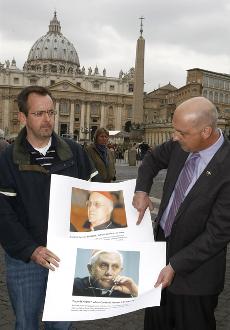 |
| John Pilmaier from Milwaukee, left, and Peter Isely of the SNAP bureau (Survivors Network of those Abused by Priests) show pictures of Pope Benedict XVI, left, and of cardinal Tarcisio Bertone during a press conference in front of the Vatican Thursday, March 25, 2010. SNAP members denounce Benedict's handling of the case that involved father Murphy, who died in 1998, accused of molesting some 200 deaf boys as he worked at the former St. John's School for the Deaf in St. Francis from 1950 to 1975. Cardinal Joseph Ratzinger's deputy at the Congregation for the Doctrine of the Faith,ruled that the alleged molestation had occurred too long ago and that the accused priest, Rev. Lawrence Murphy, should instead repent and be restricted from celebrating Mass outside of his home diocese. |
The Catholic clergy sex abuse crisis that exploded across the USA in 2002 is now detonating across Ireland and Germany and up to the doorstep of the Vatican where abuse victims demonstrated on Thursday, demanding full accountability by the Church.
Pope Benedict XVI himself is under attack for failing to defrock predatory priests or to toss out bishops who put the image of the church ahead of the safety of child and teen victims.
Vatican defenders are punching back, calling the spate of stories a concerted attack on the Church.
But the questions driving interviews Thursday were: Would or should Benedict resign? Will the crisis ever die out? And what impact is this having on the faithful? Is the pope's moral leadership damaged?
On Thursday, the New York Times reported that during the decades when he headed the Congregation for the Doctrine of the Faith, before he became pope in 2005, Cardinal Joseph Ratzinger and his aides overruled two Wisconsin bishops who sought a church trial against the Rev. Lawrence Murphy, who was accused of molesting some 200 deaf boys.
The Pope is also under fire with German critics outraged over cases of 300 school children abused in church choirs and schools and news this week that while Ratzinger served as a bishop in Munich he failed to defrock a pedophile priest who was a repeat offender.
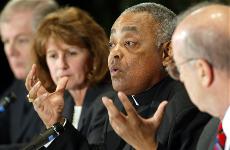 |
| Bishop Wilton D. Gregory, president of the U.S. Conference of Catholic Bishops, second from right, answers questions from the media at a press conference held at the National Press Club to present the Photo by Tim Dillon |
Leaders of the Survivors Network of Those Abused by Priests (SNAP) demonstrated in St. Peter's Square, denouncing the Vatican's handling of the Murphy case and its consistent refusal to openly release the names and parish service history of all priests credibly accused of abuse.
But papal expert George Weigel, a senior fellow at the Ethics and Public Policy Center in Washington D.C., said,
What came to light in the USA in 2002 went back 50 years and spiked in late 60s and early 1980s. What happened in Ireland happened even longer ago and in Munich it was 35 years ago.
These are all horrible acts by despicable people but it was decades ago and the suggestion that there is a criminal conspiracy of sexual abusers run from a corrupt Vatican is simply wrong, false and reprehensible.
The Pope has already made it clear that the bishops of Ireland made horrible mistake and they will be held accountable. Expect significant changes in the leadership in Ireland.
And expect that worldwide, this pope is signaling to everyone: There is to be no more putting what is imagined to be the interests of the Church ahead of protecting children.
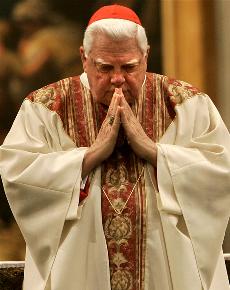 |
| U.S. Cardinal Bernard Law, who resigned in disgrace as archbishop of Boston over his role in the clergy sex abuse crisis, prays during a Mass at the St. Mary Major Basilica in Rome, Sunday, April 10, 2005. Photo by Anja Niedringhaus |
The U.S. church in 2002 established zero tolerance for priests credibly accused of abuse, set up clear abuse reporting procedures, and creates child protection programs.
A recent report from the U.S. Conference of Catholic Bishops showed allegations of abuse have been steadily falling, including a 36% decline in 2009 over 2008. And the number of offenders fell 32% with most "dead, no longer in the priesthood, removed from ministry or missing," according to The Associated Press.
Not all those program and policies can transfer beyond the USA, particularly not to countries where churches are subsidized by the government, and church and state laws are intertwined.
What the whole Catholic world does share are bishops who have by-and-large have not been held accountable for the mismanagement of their priests.
In the U.S., only the archbishop of Boston, epicenter of the 2002 scandal, Cardinal Bernard Law, resigned the Boston post when it became clear in protests from priests and parishioners that he could no longer effectively preach, teach or govern -- the three tasks of a bishop.
Rev. Thomas Reese, a Jesuit priest, Vatican expert and political scientist, says,
Unless the Church wants this crisis to go on and on and on, if it really wants to restore credibility, it will have to be more transparent about (naming and removing) abusive priests and holding bishops accountable for mismanagement that harms children.
Will the story go away?
Not hardly, although Reese despaired,
I'm sick of all this. I've been answering questions about abuse since 1985. Enough is enough!
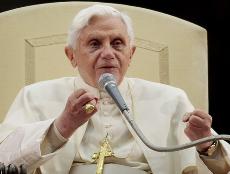 |
| Pope Benedict XVI makes a fist as he speaks at a youth gathering in St. Peter's square, at the Vatican, Thursday, March 25, 2010. The Vatican on Thursday strongly defended its decision not to defrock an American priest accused of molesting some 200 deaf boys in Wisconsin and denounced what it called a campaign to smear Pope Benedict XVI and his aides. Photo by Gregorio Bordgia |
What will not happen? The pope will not resign or be removed, the experts agreed.
There are no provisions in church law for removing a pope and in all history only a handful of popes have ever resigned, says National Catholic Reporter columnist and former Vatican correspondent John Allen.
"The theology of the election of a pope is that the cardinals are guided by the Holy Spirit," says Allen, and God's choice doesn't resign.
Still, says Allen,
We can expect a drumbeat of revelations on Ratzinger's past will continue. He has 30 years as a senior leader of the Church and every case that theoretically could have come to his attention will come under intense scrutiny. The Vatican will be tied down for months if not years defending his record.
Bishop accountability is the huge piece of unfinished business and that's what makes new revelations that the pope himself failed to manage his bishops so explosive. Can he credibly crack heads with bishops if his own record is not better?"
But neither will angry Catholics in the USA or Europe storm out of their churches over this. Allen says,
The empirical data in the United States shows that the massive declines in Mass attendance predicted in 2002 never happened. For the most part, Catholics experience their church in their local parish and their faith is in God and Christ, not in the human beings running the church. They will see these headlines as disappointing, sad and terrible but not something that will shake their faith.
Besides, Catholics have already been leaving the church for years for different reasons. Reese says,
We have lost one in three Catholics born and baptized in the USA. I don't see the bishops taking this seriously at all. This is the equivalent of being on the Titanic. The only reason the numbers are staying up is the immigrants who replaced American-born Catholics.
They leave for two reasons, Reese says: They're bored with the service, the music, preaching and liturgy, or they have had a bad personal experience with a priest like being denied communion. But, says Reese,
As long as they like the priest who is pastoring their parish, they'll keep coming back.
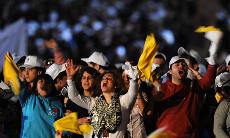 |
| Youths greet Pope Benedict XVI (not pictured) as he arrives to lead the meeting with the youth of Rome and the Lazio region in preparation for World Youth Day in St.Peters square at the Vatican on March 25, 2010. Photo by Alberto Pizzoli |
Maybe.
In a 2008 study by the research arm of the U.S. bishops, only 43% of Catholics say they look to church teachings, the pope and their bishops "in deciding what is morally acceptable." Despite waves of enthusiasm for the pope at World Youth Day events, the study Sacraments Today, by the Center for Applied Research in the Apostolate also found only 23% of young U.S. Catholics agreed strongly with that statement.
Tom Beaudoin, associate professor of theology at Fordham University, a Catholic university in Manhattan, says his undergraduate students are redefining their faith in ways that make the pope irrelevant. Beaudoin says,
My Catholic students, for the most part, consider that they finally get to decide for themselves about their practice and they understand that the Church is an ever more fallen institution. This continuing crisis speeds them along the path spiritual autonomy without them giving up their right to call themselves Catholic.
Do you think the Pope's moral leadership worldwide will be damaged by a steady stream of revelations from around the world on mishandled cases of abuse?
Whatever your view, remember the rules here: All views, respectfully presented, are welcome. Watch your tone.
Any original material on these pages is copyright © BishopAccountability.org 2004. Reproduce freely with attribution.